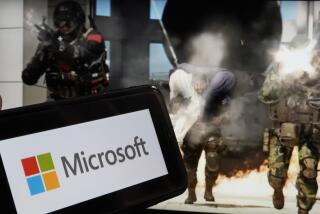Court Lifts Ban on Bundling Browser With Windows 98
- Share via
SAN FRANCISCO — In an important but possibly temporary victory for Microsoft Corp., a federal appeals court issued a ruling Tuesday that clears the way for the software giant to bundle its Internet browser with the upcoming release of its Windows 98 operating system.
The ruling lifts an antitrust restriction placed on the Redmond, Wash.-based company by a lower court that had barred Microsoft from requiring computer makers to install both programs on their machines.
Microsoft’s legal outlook was further complicated Tuesday by Sun Microsystems Inc., which asked a federal court for an injunction that could block the release of Windows 98 on the grounds that it contains an illegally doctored version of Sun’s Java programming technology.
But the developments took place under a legal cloud because federal and state authorities are expected to file broad antitrust complaints against Microsoft this week. The looming cases present far greater threats to the company and its plans for Windows 98.
“What happened [Tuesday] seems to me a little like subtext,” said Daniel Kunstler, an analyst at J.P. Morgan Securities in San Francisco. “It’s like the warmup act before the big concert. The larger issue is, can or will the federal government and the states bring action that could impede Microsoft?”
Nevertheless, Microsoft called the ruling by the U.S. Circuit Court of Appeals for the District of Columbia “very significant news” and took it as a measure of vindication in its long-running battle with regulators.
“We’re gratified that the court acted so promptly and agreed with our position,” said William H. Neukom, Microsoft’s senior vice president for law and corporate affairs. “We don’t believe there is any legal basis for blocking or delaying Windows 98, and there certainly is no consumer benefit from denying the latest technology to millions of American consumers.”
The Windows upgrade represents the biggest product launch for Microsoft since it introduced Windows 95 three years ago, and the new version is expected to drive computer and software sales through the rest of the year. The company and its allies have argued that disrupting the Windows 98 release could jeopardize vast portions of the economy.
But the legal wrangling is not specifically centered on Windows. Rather, it stems from the controversial ways Microsoft has exploited its near-monopoly in the operating-system market to gain a foothold in other markets. In particular, the company has been accused of forcing computer makers to carry its Internet Explorer Web browser or risk being denied Windows.
Netscape Communications Corp., the Mountain View company that popularized browser software, has complained vehemently that Microsoft’s bundling tactics and practice of giving its browser away for free are predatory by design and have reduced Netscape’s market share from as high as 90% several years ago to barely 60% today.
The Department of Justice filed a suit against Microsoft last year accusing the company of violating a consent decree in which it had agreed not to bundle other products with Windows. Microsoft has argued that Internet Explorer and Windows are not separate products, but a joint enhancement of the operating system, and that the company should be free to make such innovations.
A lower court had sided with the Justice Department by issuing an injunction ordering Microsoft to separate its Explorer browser from Windows. Tuesday’s ruling lifts that injunction, and some legal experts said it weakens federal authorities’ position in other cases.
“This decision certainly doesn’t help the Justice Department,” said Charles F. Rule, a Washington antitrust lawyer and former head of the department’s antitrust division.
But others argued that the ruling was not a serious setback to the government because federal officials are no longer concerned with the consent decree but are assembling far broader antitrust allegations against Microsoft.
“The appeals ruling is more a rebuke of the [lower court] judge than the Department of Justice,” said Ernest Gellhorn, an antitrust expert at George Washington University.
Still, the Justice Department will have to move swiftly if it hopes to block the release of Windows 98. The company is scheduled to begin delivering the product to computer manufacturers by Friday and to sell it in stores June 25.
Meanwhile, the motion filed by Microsoft’s longtime nemesis, Mountain View-based Sun Microsystems, also could disrupt the release of Windows 98.
Sun’s filing, attached to a breach-of-contract suit the company filed against Microsoft last year, centers on a claim that Windows 98 contains an illegally doctored version of Java, a powerful programming language developed by Sun and licensed by Microsoft.
Sun has asked the court to force Microsoft to include an approved version of Java or be barred from shipping Windows 98. Java is widely considered a threat to Microsoft because it allows programs to run on any operating system.
Microsoft, which derives much of its market might from the fact that most software today is written specifically to mesh with its Windows operating system, has been accused of trying to undermine Java by developing a Microsoft “flavor” of the language that is incompatible with others.
Analysts said Sun’s legal maneuver is unlikely to halt Windows 98, and Sun attorneys acknowledged that they don’t expect a hearing on the matter to be scheduled until after Windows 98 is released.
“I doubt that it is going to have an impact on Windows 98,” analyst Kunstler said.
*
Times staff writer Jube Shiver Jr. in Washington contributed to this report.






